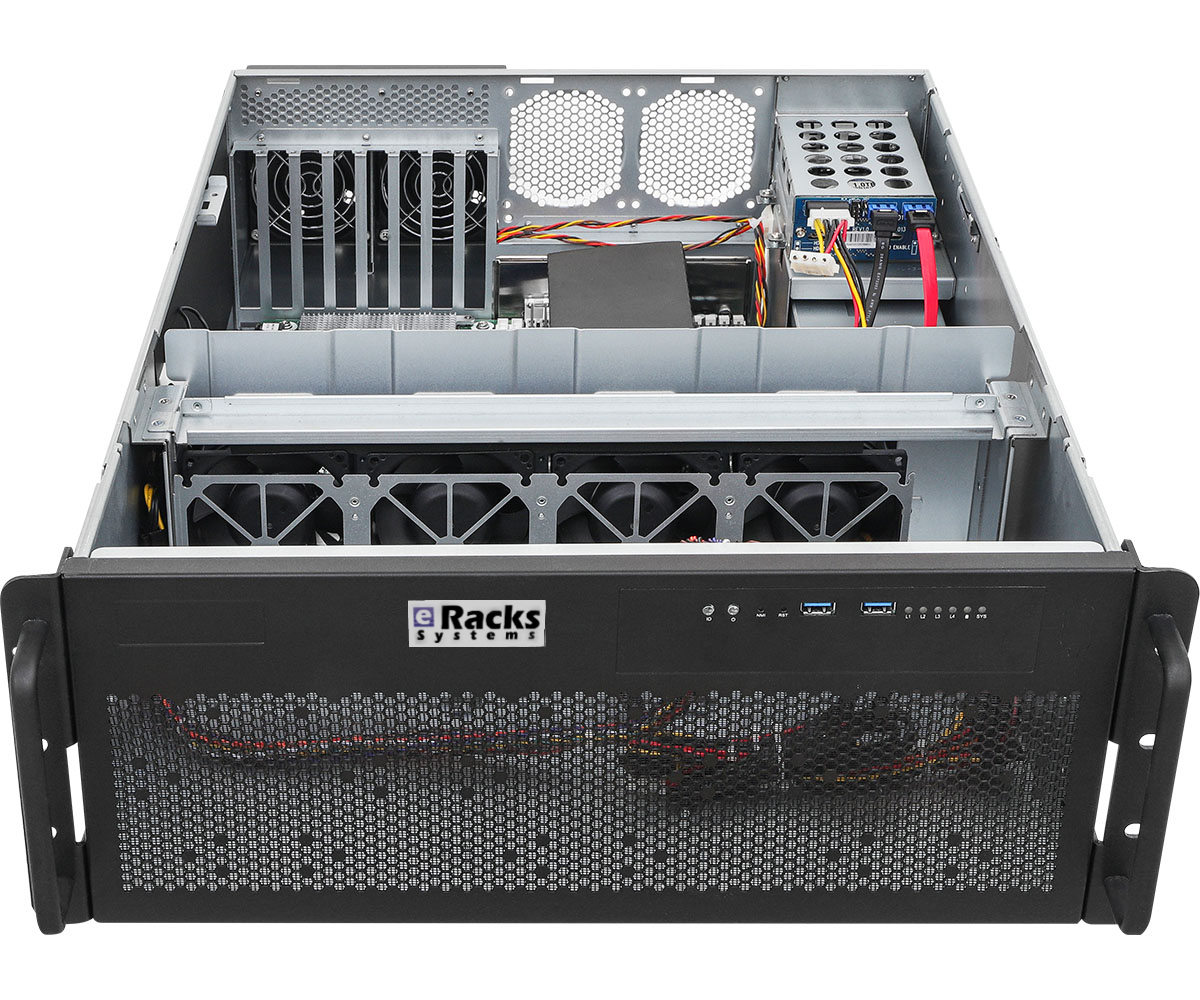eRacks Systems Tech Blog
Open Source Experts Since 1999
Introducing the eRacks AI Server Lineup: RAM-First Local AI for the Real World
You Want Local AI
Tired of cloud AI bills that keep climbing? Worried about sending sensitive data to third parties? Want to run the latest open-source LLMs like DeepSeek, Llama, Mixtral, or Qwen — on your own hardware?
We’ve been getting a lot of questions about AI servers lately, so we’re excited to officially announce our RAM-optimized AI Rackmount Server lineup — four models designed from the ground up for local-first AI computing.
The Big Idea: RAM > GPU Hype
Here’s something the big vendors don’t want you to know: for many AI workloads — especially LLM inference, RAG pipelines, and vector search — total system RAM matters more than having the flashiest GPU.
Why? Because large language models need to fit somewhere. If your model doesn’t fit in VRAM, it spills into system RAM. If it doesn’t fit there, you’re swapping to disk — and that’s game over for performance.
Our servers are built around this insight. We focus on massive RAM capacity combined with COTS (Commercial Off-The-Shelf) GPUs — the cards you can actually buy, at prices that won’t require board approval.
Meet the Family
So far, we’ve got four models, each named after Celtic / Gaelic names that happen to start with “AI” (we couldn’t resist):
Model Form Factor Max RAM GPUs Starting Price Sweet Spot
eRacks/AILSA 2U 512GB Up to 3 (LP) $4,995 SMBs, solo devs, 200-600B+ models
eRacks/AIDAN 2U 3TB Up to 3 $9,995 Small teams, 800B+ models, RAG
eRacks/AINSLEY 4U 2TB Up to 4 $14,995 R&D, training, fine-tuning
eRacks/AISHA 4U 6TB Up to 8 $19,995 Enterprise, hosting, all MoE models
eRacks/AILSA — The Entry Point
“Affordable Innovative Local Server for Artificial Intelligence” 😄
AILSA is our compact 2U starter — perfect for startups, researchers, and developers who want local AI without the sticker shock. With up to 512GB RAM and 3 low-profile GPUs (Intel Arc B50 or NVIDIA RTX 5060 LP), it punches well above its weight class for inference workloads.
Best for: Private chatbots, development sandboxes, entry-level RAG, running 600B+ parameter models locally.
eRacks/AIDAN — “The RAMstack”
AIDAN steps up to Dual AMD EPYC processors and up to 3TB of DDR5 ECC RAM. This is the machine for teams doing serious vector search, RAG pipelines, or serving LLMs to multiple users.
Best for: Small-to-medium teams, 800B+ models, retrieval-augmented generation, production inference.
eRacks/AINSLEY — The R&D Workhorse
Our 4U Threadripper-based system with up to 4 full-size GPUs and 2TB RAM. AINSLEY is built for the folks who need to train, fine-tune, and experiment — not just run inference.
Best for: Research labs, AI/ML startups, fine-tuning on private datasets, local experimentation.
eRacks/AISHA — The Beast
“Advanced Intelligent Server for High-RAM AI”
When you need to go all-in: up to 6TB RAM, up to 8 GPUs, and dual Intel Xeon or AMD EPYC processors. AISHA handles the largest MoE (Mixture of Experts) models, multi-tenant deployments, and enterprise-scale AI infrastructure.
Best for: Enterprise hosting, 800B+ models, multi-user deployments, running every MoE model out there.
Why Local? Why Now?
A few reasons we’re seeing massive demand for on-prem AI:
Privacy — Your data never leaves your building
Cost control — No per-token fees, no surprise bills
No rate limits — Run as many queries as your hardware can handle
Model freedom — Run any open-source model: Llama, DeepSeek, Mistral, Qwen, Gemma, and more
Customization — Fine-tune on your own data without uploading it anywhere
100% Open Source Ready
All our AI servers ship with Ubuntu and Ollama pre-installed, plus your choice of models (Llama, DeepSeek, Qwen, etc.). We also support custom preconfigurations:
• PyTorch, TensorFlow, JAX
• Hugging Face Transformers
• LangChain, vLLM, LM Studio
• OpenWebUI, LibreChat
• Milvus, Chroma (vector databases)
• Docker / Podman for containerized workflows
And of course — Rocky Linux, Fedora, Debian, or whatever distro you prefer. It’s your hardware.
COTS GPUs: No Vendor Lock-In
We spec readily available GPUs — NVIDIA RTX 30×0/40×0/50×0 series, professional A-series cards, Intel Arc, and AMD options. No waiting 6 months for an allocation. No $30k price tags for a single card. Swap, upgrade, or scale on your terms.
Ready to own your AI stack?
👉 Check out the full AI Server lineup – eracks.com/products/ai-rackmount-servers/
👉 Contact us for a custom quote
We’re happy to help you figure out the right balance of RAM, GPU, and storage for your specific workloads. That’s what we do.
Get Started: eRacks.com/contact
j
joe January 17th, 2026
Posted In: AI, Deep Learning, LLM, Local AI, Ollama, Open Source, Rackmount Servers, RAG, Technology
Tags: AI, Deep Learning, DeepSeek, EPYC, eRacks, eRacks Partner, GPU, Llama, LLM, Local AI, Machine Learning, Ollama, Open Source, Rackmount Servers, RAG, Threadripper
More on Open-Washing
We are now an official supporter of the OSAID (Open Source AI Definition):
J

joe January 28th, 2025
Posted In: AI
Tags: AI, eRacks, Open Source, Open Washing, Rackmount Servers
‘Tis the Open Source Season
From all of us here at eRacks Systems to all of you, we wish you a very Merry Christmas and Happy Holiday Season.

And here’s a great article about how Linux can help Santa:
https://betanews.com/2024/12/22/how-santa-claus-could-transform-christmas-with-linux
joe December 24th, 2024
Posted In: Greetings, Linux, News, Open Source
Tags: Christmas, Linux Infrastructure, Santa, tree, Tux, Xmas



